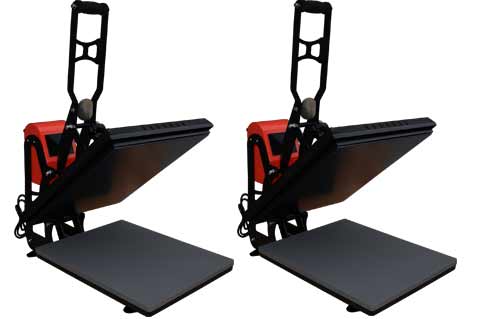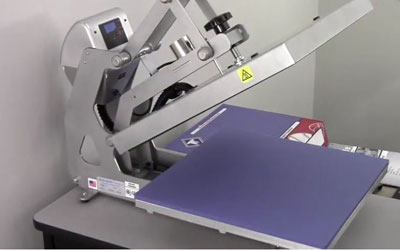Strategy November 04, 2016
How to Clean Your Heat Press
A clean press is a happy and functional press!
If you print screen-print transfers or do any kind of heat printing, you’ve probably had the experience of printing a transfer upside down or ended up with adhesive residue on a platen. Possibly you melted a bag by printing at too high a temperature for the material. There are a variety of reasons why a heat press can become dirty over time, or it could just be simple wear and tear. The important thing to remember is that, like any other piece of equipment in a shop, heat presses need to be cleaned and maintained on a regular basis to function at their best.

Here are some tips that will help you keep your press in top working condition.
Tip #1
Speed is essential. You’ve printed a plastisol heat transfer to the top of the press instead of to the shirt for which it was intended. Once you realize what’s happened, speed is of the essence to ensure you remove the transfer quickly. Ongoing exposure to high heat will cause the ink to “cook” and make the transfer even more difficult to remove.
Tip #2
Lower the heat. Accidents do happen, but cleaning a press at 350° to 400° Fahrenheit means even more accidents or burns in the making. When you realize that something has printed incorrectly, you don’t want to leave ink or debris on the press. First, turn the press off immediately. You may not have to wait for it to cool; in fact, working with a warm press makes inks or adhesives easier to remove. Remember not to try to clean a press that’s hot enough to burn, and always wear heatproof hand protection.
Tip #3
Be gentle. Use a soft cloth, perhaps a T-shirt, and a gentle cleanser, like a mechanics non-abrasive hand cleaner, a household iron cleaner or mild soap and water. Some heat presses may have platens that are covered with a non-stick coating. Using an abrasive cleaning pad or a cleaning solution with grit can cause that coating to be rubbed off or scratched. Scratches in the coating can cause issues with pressure and temperature, and may lead to future transfers not adhering to the fabric properly.
Tip #4
Prevent messes before they start. Use screen-printed transfers with a release paper that acts as a cover sheet, which is a good way to protect your press if the transfer is pressed incorrectly. Adding a lower platen cover can protect the press’s lower platen from dirt or debris issues, and can also help reduce wear and tear on the corners of the platen that’s caused by repeated loading and unloading of garments.
Watch This!
The best way to avoid dirtying your heat press is to learn to use it properly from the start. This video from Transfer Express offers instructions for those just starting out with a heat press, and tips for decorators who may need a refresher course. Watch the video here.

